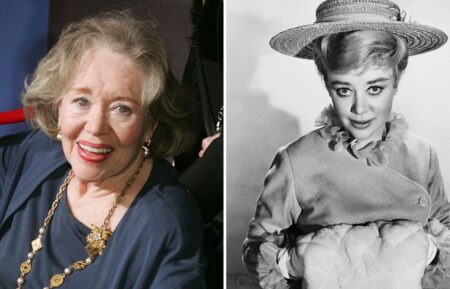Fondly remembered for the breathy quality of her husky voice and her eternally upbeat persona, British actress Glynis Johns delivered a myriad of memorable roles in a varied career that spanned over 60 years. Born into a theatrical family, Johns began performing on the stage by the age of 12 and in film while still in her teens. Early films roles included her starring turn as a flirtatious mermaid in the popular fantasy-comedy "Miranda" (1948), the thriller "State Secret" (1950) and the "Miranda" sequel "Mad About Men" (1954).
Following a well-regarded run on Broadway in a revival of "Major Barbara" in 1956 and a disappointing outing as the star of her own television sitcom, "Glynis" (CBS, 1963), the actress appeared in one of the most popular family musicals in film history, "Mary Poppins" (1964), as the well-intentioned suffragette, Winifred Banks. Even more memorable was her lengthy performance as Desiree Armfeldt in the 1973 premiere of the Wheeler-Sondheim musical comedy "A Little Night Music," in which she immortalized the heart-breaking ballad "Send in the Clowns." In the years after her Tony Award-winning tour with the show, Johns went on to dozens of endearing roles in films like "While You Were Sleeping" (1995) well into the late-1990s. Whether portraying a sultry sea creature, a neglectful mother or a delightfully eccentric grandmother, Johns was never anything less than an absolute joy onscreen.
Glynis Johns was born on Oct. 5, 1923 in Pretoria, South Africa while her parents, actor Mervyn Johns and pianist Alys Maude were performing on tour. Her Welsh parents had met while studying at the Royal Academy of Music and it was Johns' grandmother, violinist Elizabeth Steele, who had suggested they embark on the South African tour. Drawn to dancing by the time she learned to walk, Johns was a certified ballet instructor by the unbelievably young age of 10, and qualified as an advanced teacher by 12. Partly a matter of necessity due to her parents' profession, the young girl soon began acting and made her London stage bow as a child in a 1935 production of "Buckie's Bears" at the Garrick Theatre. She followed a year later with a turn as Mary Tilford in Lillian Hellman's "The Children's Hour," in addition to performing in "St. Helena" at the Old Vic. At the age of 14, Johns made her screen debut in Victor Saville's "South Riding" (1938), in which she showed promise as the headstrong daughter of local politician Ralph Richardson. After several more film appearances, she appeared with Sir Laurence Oliver - a theatrical contemporary of her father's - in the World War II spy thriller "The 49th Parallel" (1941), directed by Michael Powell.
Never one to stay away from the theater for long, Johns returned to the London stage at the age of 19 in order to take on the title role in a mounting of the family favorite "Peter Pan" in 1943. A versatile actress most often associated with comedy, Johns showed her dramatic mettle with her performance in "Frieda" (1947), playing a sister-in-law who befriends the German war bride (Mai Zetterling) of an English schoolteacher (David Farrar). It was, however, with her playful embodiment of the flirtatious, titular mermaid in the comedic fantasy "Miranda" (1948) that Johns made her first big splash at the box office. Shortly after appearing as a sympathetic actress helping a targeted doctor on the run (Douglas Fairbanks, Jr.) in the conspiracy-thriller "State Secret" (1950), Johns made her brief Broadway debut in 1952 as the eponymous star of the comedy "Gertie" before it closed after only five performances. Returning to the U.K., Johns reprised the role of Miranda - in addition to a dual role as a look-alike human counterpart - for the comedy sequel "Mad About Men" (1954), which found the boy-crazy mermaid causing mischief on dry land once again.
Johns enjoyed far greater success with her second crack at Broadway, this time cast as playwright George Bernard Shaw's "Major Barbara" (1956) in a production directed by legendary actor Charles Laughton. By this time, the actress' spirited personality had become her signature, enlivening whatever material she chose, be it on stage or film. She proved a vivacious delight in her Oscar-nominated supporting turn as a hotelkeeper who sets her sights on a matrimonially-adverse Peter Ustinov in the Australian adventure "The Sundowners" (1960), co-starring Robert Mitchum and Deborah Kerr. Other work included a starring role in the Robert Bloch scripted "The Cabinet of Caligari" (1962), a psychological thriller which bore scant resemblance to the similarly titled 1920 German expressionist classic. Johns also made inroads in the medium of television, where the actress starred in her own sitcom, "Glynis" (CBS, 1963), a short-lived effort that cast her as a novice mystery writer and amateur sleuth who solves murders, much to the chagrin of her clueless husband (Keith Andes).
Of all her numerous roles on stage and screen, Johns was best remembered as the distracted suffragette wife of the order-obsessed Mr. Banks (David Tomlinson) in the Disney live-action smash hit musical "Mary Poppins" (1964), starring Julie Andrews in the title role. During the same period, she was a standout as James Stewart's practical wife in "Dear Brigitte" (1965), then had some fun with tongue-in-cheek villainy as Lady Penelope Peasoup in several 1967 episodes of the popular campy adventure series "Batman" (ABC, 1966-68). Always fiercely proud of her Welsh roots, she particularly enjoyed her work on screen opposite fellow Welshman Richard Burton in the film version of Dylan Thomas' sardonic masterpiece of modern language, "Under Milkwood" (1972). John's most indelible Broadway turn came as Desiree Armfeldt, the leading lady of the Hugh Wheeler-Stephen Sondheim hit musical "A Little Night Music" (1973). After a particular scene was staged by director Harold Prince, Sondheim, realizing a song was required for her character, quickly tossed off the contemporary standard "Send in the Clowns," which the composer tailored for Johns' particular vocal qualities - what Sondheim equated with "a rumpled bed." Her bravura performance in the role later won the actress a Tony Award as Lead Actress in a Musical.
Never shy about tackling genre material in film, she appeared in a segment of the Amicus-produced portmanteau "The Vault of Horror" (1973), followed by a similarly structured frightfest four years later, appropriately titled "Three Dangerous Ladies" (1977). After an extended period away from the camera, Johns returned to TV with several guest spots, followed by a run as a series regular in "Coming of Age" (CBS, 1989-1990), playing the perpetually perky Trudie Pepper. The actress returned to Broadway once again in a 1989 revival of the Somerset Maugham play "The Circle," starring opposite Rex Harrison and Stewart Granger, and later took part in a 1991 Los Angeles revival of "A Little Night Music," this time portraying Madame Armfeldt, the mother of the character she had originated on Broadway. As she matured, her spunky persona lent itself readily to roles as eccentric grandmothers in comedic efforts such as "The Ref" (1994) and "While You Were Sleeping" (1995).
In one of her final stage performances, Johns starred in a 1998 Long Island staging of Horton Foote's play "A Coffin in Egypt," playing a 90-year-old grand dame reminiscing about her life on and off a Texas ranch. After an appearance as the grandmother of eternally nerdy and hyperactive schoolgirl Mary Katherine Gallagher (Molly Shannon) in the "Saturday Night Live" (NBC, 1975- ) spin-off comedy "Superstar" (1999), Johns effectively retired from acting, although a return to the screen was never out of the realm of possibility for the venerable actress.
By Bryce Coleman







































































